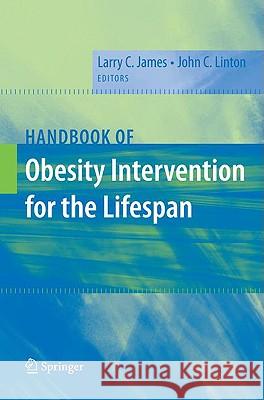Handbook of Obesity Intervention for the Lifespan » książka



Handbook of Obesity Intervention for the Lifespan
ISBN-13: 9780387783048 / Angielski / Twarda / 2008 / 143 str.
Handbook of Obesity Intervention for the Lifespan
ISBN-13: 9780387783048 / Angielski / Twarda / 2008 / 143 str.
(netto: 383,36 VAT: 5%)
Najniższa cena z 30 dni: 385,52
ok. 16-18 dni roboczych.
Darmowa dostawa!
Obesity is a major risk factor for a variety of cardiovascular, cardiopulmonary, endocrinologic, metabolic, musculoskeletal, and behavioral disorders.
Wydanie ilustrowane
From the reviews:
"It is a handbook that is organized with a life-span focus. The individual chapters are mostly well written ... . the editors have also included a list of helpful resource references and Web-based resources. ... Overall, this handbook is a welcome source of information that succinctly reviews current evidence and practical recommendations for treating obese patients. ... James and Linton's handbook will be a useful text in the classroom. Physicians and health psychologists will find this handbook a valuable source of information." (Philip Knowles, PsycCRITIQUES, Vol. 54 (26), July, 2009)
Child and Adolescent Obesity Applications.- Childhood Obesity Treatment Literature Review.- Practical Guidelines for Childhood Obesity Interventions.- Adolescent Obesity: Review of the Treatment Literature.- Adolescent Obesity.- Innovations in Preventing and Treating Obesity in Children and Adolescents: The Role of Physical Activity Interventions.- Treating Obesity in the Adult and Elderly Populations.- Why Do Some People Lose Weight and Keep It Off? Ten Common Steps for Successful Weight Loss Over the Lifespan.- Obesity and Older Adults: To Lose or Not to Lose???.- Low-Intensity Exercise as a Treatment Intervention in Obese Adults.- Bariatric Surgery.- Treatment Resources for Providers.- Books, NIH and Journal Helpful References.- Web-Based Resources.
Larry James, Ph.D, ABPP, is the Dean School of Professional Psychology Wright State University, Dayton, OH, USA. Previously a chair of the Department of Psychology at Tripler Army Medical Center, Honolulu . He also holds adjunct appointments at the Uniformed Services University of the Health Sciences School of Medicine, Howard University Hospital, University of West Florida, American School of Professional Psychology, University of Hawaii, and Hawaii Pacific University. He is President-elect of the American Board of Health Psychology, on the Board of Trustees of the American Board of Professional Psychology, on the Board of Directors of Division 38 (Health Psychology) of the American Psychological Association, and a member of the Presidential Task Force on Psychological Ethics and National Security. He is an Associate Editor on the Journal of Military Psychology (Division 19 of the American Psychological Association) and has received numerous professional, military, and athletic honors.
John Linton, Ph.D, ABPP is Vice Chair and Professor in the Department of Behavioral Medicine and Psychiatry, West Virginia University School of Medicine. In addition, he serves as Director of Predoctoral Internship in Clinical Psychology, Director of Medical Education, and Chief Psychologist at the same institution. He is on the APA Council of Representatives for 2007-2010, is an APA/Red Cross state disaster mental health coordinator, and is President (2006) of the Association of Psychologists in Academic Health Centers (a section of Division 12 of APA). From 1979 through 1994 he was Editor of The Health Psychologist.Handbook of Obesity Intervention for the Lifespan
Edited by Larry C. James, Wright State University, Dayton, OH, USA
John Linton, West Virginia University School of Medicine, Charleston
Environmental, genetic, psychological, and societal factors interact to produce obesity, a chronic condition of epidemic proportions. The Handbook of Obesity Intervention for the Lifespan guides professionals in meeting this complex challenge with a multidisciplinary palette of evidence-based interventions that can be tailored to men and women across the lifespan, regardless of background. This unique reference combines salient research data and hands-on clinical applications for use with overweight patients, from the very young to the very old, and includes a "treatment resources" section with extra materials to bolster therapy—all geared toward respectful, encouraging treatment and lasting weight-loss results.
Key features of the Handbook:
- Review of the obesity literature, both pediatric and adult.
- Exercise interventions for children and adults.
- Lifestyle interventions for adolescents, adults, and seniors.
- Weight-related cultural issues throughout the lifespan.
- Bariatric surgery: when is it indicated? How successful is it?
- The ten critical steps to healthy weight loss.
- Clinical resources, patient self-help materials, and useful websites.
With excess weight contributing to some 300,000 deaths in the U.S. each year, the Handbook of Obesity Intervention for the Lifespan will be welcomed—and consulted frequently—by clinical and health psychologists, psychiatrists, primary care providers, and nutritionists.
1997-2026 DolnySlask.com Agencja Internetowa
KrainaKsiazek.PL - Księgarnia Internetowa









